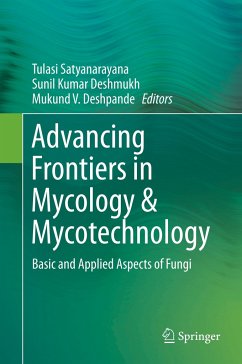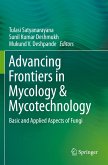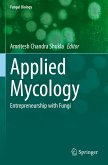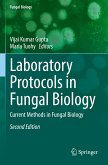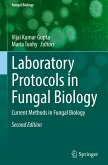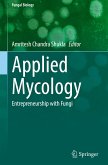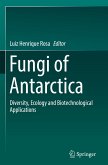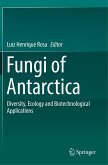Advancing Frontiers in Mycology & Mycotechnology
Basic and Applied Aspects of Fungi
Herausgegeben:Satyanarayana, Tulasi; Deshmukh, Sunil Kumar; Deshpande, Mukund V.
Advancing Frontiers in Mycology & Mycotechnology
Basic and Applied Aspects of Fungi
Herausgegeben:Satyanarayana, Tulasi; Deshmukh, Sunil Kumar; Deshpande, Mukund V.
- Gebundenes Buch
- Merkliste
- Auf die Merkliste
- Bewerten Bewerten
- Teilen
- Produkt teilen
- Produkterinnerung
- Produkterinnerung
The book provides an introduction to the basics of fungi, discussing various types ranging from edible mushrooms to Neurospora - a model system for genetics and epigenetics. After addressing the classification and biodiversity of fungi, and fungi in different ecological niches, it describes the latest applications of fungi, their role in sustainable environments and in alleviating stress in plants, as well as their role in causing plant and animal diseases. Further chapters explore the advances in fungal interactions research and their implications for various systems, and discuss…mehr
Andere Kunden interessierten sich auch für
![Advancing Frontiers in Mycology & Mycotechnology Advancing Frontiers in Mycology & Mycotechnology]() Advancing Frontiers in Mycology & Mycotechnology161,99 €
Advancing Frontiers in Mycology & Mycotechnology161,99 €![Applied Mycology Applied Mycology]() Applied Mycology185,99 €
Applied Mycology185,99 €![Laboratory Protocols in Fungal Biology Laboratory Protocols in Fungal Biology]() Laboratory Protocols in Fungal Biology137,99 €
Laboratory Protocols in Fungal Biology137,99 €![Laboratory Protocols in Fungal Biology Laboratory Protocols in Fungal Biology]() Laboratory Protocols in Fungal Biology137,99 €
Laboratory Protocols in Fungal Biology137,99 €![Applied Mycology Applied Mycology]() Applied Mycology185,99 €
Applied Mycology185,99 €![Fungi of Antarctica Fungi of Antarctica]() Fungi of Antarctica121,99 €
Fungi of Antarctica121,99 €![Fungi of Antarctica Fungi of Antarctica]() Fungi of Antarctica121,99 €
Fungi of Antarctica121,99 €-
-
-
The book provides an introduction to the basics of fungi, discussing various types ranging from edible mushrooms to Neurospora - a model system for genetics and epigenetics. After addressing the classification and biodiversity of fungi, and fungi in different ecological niches, it describes the latest applications of fungi, their role in sustainable environments and in alleviating stress in plants, as well as their role in causing plant and animal diseases. Further chapters explore the advances in fungal interactions research and their implications for various systems, and discuss plant-pathogen interactions. The book also features a section on bioprospecting, and is an extremely interesting and informative read for anybody involved in the field of mycology, microbiology and biotechnology teaching and research.
Produktdetails
- Produktdetails
- Verlag: Springer Nature Singapore / Springer, Berlin
- Artikelnr. des Verlages: 978-981-13-9348-8
- 1st edition 2019
- Seitenzahl: 704
- Erscheinungstermin: 1. November 2019
- Englisch
- Abmessung: 241mm x 160mm x 43mm
- Gewicht: 1212g
- ISBN-13: 9789811393488
- ISBN-10: 9811393486
- Artikelnr.: 56860608
- Herstellerkennzeichnung Die Herstellerinformationen sind derzeit nicht verfügbar.
- Verlag: Springer Nature Singapore / Springer, Berlin
- Artikelnr. des Verlages: 978-981-13-9348-8
- 1st edition 2019
- Seitenzahl: 704
- Erscheinungstermin: 1. November 2019
- Englisch
- Abmessung: 241mm x 160mm x 43mm
- Gewicht: 1212g
- ISBN-13: 9789811393488
- ISBN-10: 9811393486
- Artikelnr.: 56860608
- Herstellerkennzeichnung Die Herstellerinformationen sind derzeit nicht verfügbar.
Prof. T. Satyanarayana is a UGC-BSR Faculty Fellow at the Division of Biological Sciences & Engineering, Netaji Subhas University of Technology, New Delhi, after superannuating from the Department of Microbiology, University of Delhi South Campus, New Delhi, as Professor and Head, in June 2016. He has over 270 scientific papers and reviews, 8 edited books and 2 patents to his credit. He is a fellow of National Academy of Agricultural Sciences (NAAS), Association of Microbiologists of India (AMI), Biotech Research Society (I), Mycological Society of India (MSI) and Telengana Academy of Sciences. He is a recipient of Dr. Manjrekar award of AMI, Dr. Agnihotrudu award of MSI and Malaviya Memorial award of BRSI. He has over 40 years of research and teaching experience and has mentored 30 scholars for Ph.D. He was the President of AMI and MSI. His research efforts have been focused on understanding the diversity and applications of yeasts, thermophilic fungi and bacteria and their enzymes, metagenomics, carbon sequestration employing extremophilic bacterial carbonic anhydrases and bioethanol production from lignocellulosic substrates using enzyme cocktails. Dr. Sunil Kumar Deshmukh received his Ph.D. in Mycology from Dr. H.S. Gour University, Sagar (M.P.) in 1983. The veteran industrial mycologist spent a substantial part of his career at Hoechst Marion Roussel Limited [now Sanofi India Limited], Mumbai and Piramal Enterprises Limited, Mumbai in drug discovery. He has to his credit, 8 patents, 120 publications and 9 books on various aspects of Fungi and natural products of microbial origin. He is the past president of the Mycological Society of India. He is a fellow of Mycological Society of India (MSI), the Association of Biotechnology and Pharmacy and the Society for Applied Biotechnology. He is currently Fellow at Nano-Biotechnology Centre, TERI, New Delhi, and Adjunct Associate Professor in Deakin University, Australia, working towards the development of natural food colors, antioxidants and biostimulants through nanotechnology intervention. Dr. Mukund V. Deshpande obtained his PhD in 1982 in Biochemistry and D.Sc. in Microbiology of the University of Pune in 1994. His extensive work in the area of fungal biology, especially, fungal differentiation earned him D.Sc. He has worked extensively on the use of fungi and fungal products in Biotechnology. Dr. Deshpande successfully completed more than 35 research projects funded by national and international funding agencies, such as Indo-Swiss Collaboration in Biotechnology (ISCB) programme of Department of Biotechnology (DBT), New Delhi and Swiss Development Cooperation (SDC), Berne, Switzerland on development of mycoinsecticide, Indo-Belarus programme of DBT on biopesticides, Indo-Mexico programme of Department of Science and Technology, New Delhi and CONACYT on fungal dimorphism. Dr. Deshpande is an elected fellow of the Maharashtra Academy of Sciences (FMASc, 1994) and the Society for Biocontrol Advancement (FSBA, 2010). He is also a recipient of the Department of Biotechnology Overseas (Short-term) Associateship (1995), and Commonwealth Science Council Fellowship (1998). He has to his credit more than 140 research papers, reviews and chapters, 8 patents, 6 books and a number of popular articles. He has his own start-up Greenvention Biotech located in Urli-Kanchan, Pune for the translational activities in Agricultural Biotechnology.
Part 1. Basic aspects of fungi.- Chapter 1. The mystical world of mushrooms.- Chapter 2. The developmental history of Ustilago maydis: a saprophytic yeast, a mycelial fungus, a mushroom-like and a smut.- Chapter 3. Biochemical and molecular aspects of dimorphism in fungi.- Chapter 4. Biodiversity, taxonomy, conservation , ecology and utilization of Soil fungi: Indian scenario.- Chapter 5. Diversity and bioprospecting of yeasts from extreme environments.- Chapter 6. Marine fungal ecology in the molecular era.- Chapter 7. Oscillatory orchestration of the growth of Saccharomyces cerevisiae.- Chapter 8. Neurospora genetic backgrounds differ in meiotic silencing by unpaired DNA (MSUD) strength: Implications for Dp-mediated suppression of repeat-induced point mutation.- Part 2. Environmental sustainability.- Chapter 9. Fungal bioremediation: a step towards cleaner environment.- Chapter 10. Exploring fungal lignocellulose degradation: Secretomic and proteomic approaches.- Chapter 11. Fungi, the crucial contributors for nanotechnology: a green chemistry perspective.- Part 3. Interactions with plants, animals and humans.- Chapter 12. Recent developments in ectomycorrhizal fungal research.- Chapter 13. Rumen microbiome and plant secondary metabolites: Inhibition of methanogenesis and improving nutrient utilization.- Chapter 14. Class B-trichothecene profiles of Fusarium species as causal agents of head blight. - Chapter 15. Aflatoxin and ochratoxin detection and remediation for safe Health Food.- Chapter 16. The explosion of Brazilian endophytic fungal diversity: taxonomy and biotechnological potentials.- Chapter 17. Arbuscular Mycorrhizal Fungi in alleviation of cold stress in plants.- Chapter 18. Challenges in invasive fungal diseases.- Chapter 19. Diversity of endophytic fungi and their role in artificial agarwood production in Aquilaria.- Part 4. Bioprospects.- Chapter 20. Bioprospecting of fungal entomo- and myco-pathogens.- Chapter 21. Fungal enzymes: Sourcesand biotechnological applications.- Chapter 22. Fungi in hypogean environments: From bioprospection perspective.- Chapter 23. Secondary metabolites of mushrooms: A potential source for anticancer therapeutics with translational opportunities.- Chapter 24. Modulation of fungal metabolome by biotic stress.- Chapter 25. Marine fungi: A potential source of future cosmeceuticals.
Part 1. Basic aspects of fungi.- Chapter 1. The mystical world of mushrooms.- Chapter 2. The developmental history of Ustilago maydis: a saprophytic yeast, a mycelial fungus, a mushroom-like and a smut.- Chapter 3. Biochemical and molecular aspects of dimorphism in fungi.- Chapter 4. Biodiversity, taxonomy, conservation , ecology and utilization of Soil fungi: Indian scenario.- Chapter 5. Diversity and bioprospecting of yeasts from extreme environments.- Chapter 6. Marine fungal ecology in the molecular era.- Chapter 7. Oscillatory orchestration of the growth of Saccharomyces cerevisiae.- Chapter 8. Neurospora genetic backgrounds differ in meiotic silencing by unpaired DNA (MSUD) strength: Implications for Dp-mediated suppression of repeat-induced point mutation.- Part 2. Environmental sustainability.- Chapter 9. Fungal bioremediation: a step towards cleaner environment.- Chapter 10. Exploring fungal lignocellulose degradation: Secretomic and proteomic approaches.- Chapter 11. Fungi, the crucial contributors for nanotechnology: a green chemistry perspective.- Part 3. Interactions with plants, animals and humans.- Chapter 12. Recent developments in ectomycorrhizal fungal research.- Chapter 13. Rumen microbiome and plant secondary metabolites: Inhibition of methanogenesis and improving nutrient utilization.- Chapter 14. Class B-trichothecene profiles of Fusarium species as causal agents of head blight. - Chapter 15. Aflatoxin and ochratoxin detection and remediation for safe Health Food.- Chapter 16. The explosion of Brazilian endophytic fungal diversity: taxonomy and biotechnological potentials.- Chapter 17. Arbuscular Mycorrhizal Fungi in alleviation of cold stress in plants.- Chapter 18. Challenges in invasive fungal diseases.- Chapter 19. Diversity of endophytic fungi and their role in artificial agarwood production in Aquilaria.- Part 4. Bioprospects.- Chapter 20. Bioprospecting of fungal entomo- and myco-pathogens.- Chapter 21. Fungal enzymes: Sourcesand biotechnological applications.- Chapter 22. Fungi in hypogean environments: From bioprospection perspective.- Chapter 23. Secondary metabolites of mushrooms: A potential source for anticancer therapeutics with translational opportunities.- Chapter 24. Modulation of fungal metabolome by biotic stress.- Chapter 25. Marine fungi: A potential source of future cosmeceuticals.

